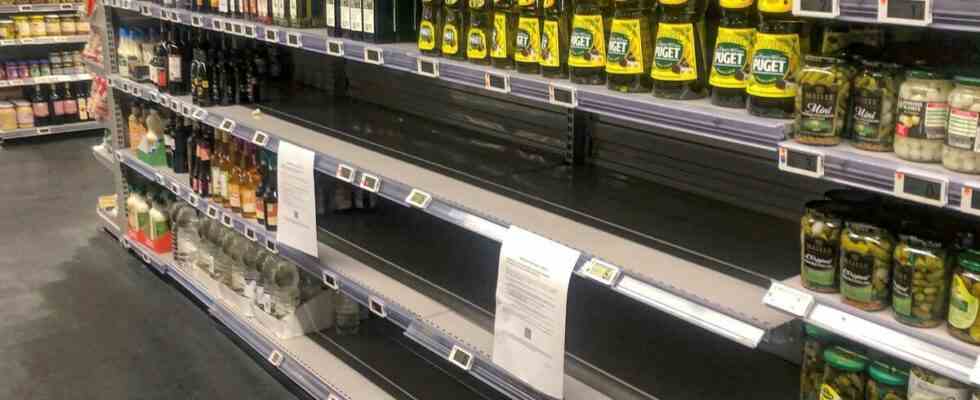Lover of fried foods and donuts, you have noticed that it has become more difficult to find sunflower oil at the moment than good news in 2020. A shortage in our supermarkets which is explained by the war between Russia and Ukraine, the two countries being the factories of the world when it comes to the precious seed.
As the conflict does not seem to be about to end, could other foodstuffs be missing from our French stores? Tensions already seem to appear on mustard jars or on products in glass bottles, such as wine or beer. Something to worry households and bring back bad memories of March 2020 when flour, eggs or toilet paper became untraceable following panic buying. At the Carrefour Market on the rue des martyrs (9th arrondissement of Paris), Théo and Natacha, a couple in their thirties, are beginning to be afraid when shopping. Looking attentively at the slightest lack on the shelves, they testify: “We stock up on the most essential products, just in case. Except for the fresh and the meat. »
“France is quasi-autonomous in terms of agricultural products”
According to several specialists, it is however not necessary to empty the shelves when going shopping. “The risk of shortage in France, except for sunflower oil which is a very specific case, is almost nil”, immediately calm Hervé Guyomard, economist and director of research at the national research institute for agriculture ( INRAE). He reminds us that France is quasi-autonomous in terms of agricultural products, the most impacted by the Ukrainian conflict. Same analysis with Clément Le Fournis, co-founder of Agriconomie: “France exports more food than it imports”.
However, the assessment is to be qualified, specifies the expert: “Since 2012, France has been exporting less and less and importing more and more”. Just as the coronavirus crisis had exposed the country’s health dependence in full light, the war between kyiv and Moscow – coupled with other events – could put the debate on the food sovereignty of the country of gastronomy back on the table. “France has enough to feed its population, but does it really want it? asks Clément Le Fournis: “It’s a question that belongs to the consumer. Does he want to have tomatoes in winter and eat avocados, or have a diet that does not depend on the world outside France? »
No scarcity, but tensions
The case is heard, we will not starve. It’s always taken, of course, but will these famous products from abroad run out? At Théo et Natacha, to hell with short circuits, we love everything and not just Made in France. So, possibility of continuing the avocado toast Sunday at home brunch or not? Here too, no worries about the risk of shortages: no product should be missing, apart from our famous sunflower oil. “With regard to mustard, for example, there may be tensions, due to very unfavorable climatic conditions in Canada, between drought and flooding. But there will be no stock shortages, just a more expensive offer because it is rare, ”says Grégory Caret, director of the Consumer Observatory at UFC-Que Choisir.
Especially since by losing the Ukrainian and Russian tanks, the West risks playing one-upmanship on certain available stocks. New parallel with the first confinement by Clément Le Fournis, when the masks went to the countries with the highest bid, regardless of the first buyer: “However, some countries, for fear of running out of food, will always outbid more in order to make reserves , further disrupting market prices. »
wallet problem
Place therefore the very bad news: if there will be no shortage, inflation, it looks rather edgy. “The French will not lack any product, but perhaps the money to buy them”, sums up Grégory Caret. An analysis shared by our couple in their thirties: “We have a weekly budget of 200 euros for shopping. Well, week after week, the basket is more and more empty, ”laments Natacha.
“Even before the war in Ukraine, prices were rising following an excessive recovery in post-covid demand compared to supply,” recalls Hervé Guyomard. The dispute only makes matters worse, kicking in two big exporters. Result ? Prices are soaring. INSEE estimates inflation for the food sector at 3.8% in April. Still according to the same institute, household consumption fell “significantly” in March, by 1.3%, mainly due to the decline in food consumption (- 2.5%).
“The less the product is processed, the more expensive it will be”
Some products are particularly affected: according to IRI (Information Resources, Inc.), between April 2021 and April 2022, the price of pasta increased by 15.31%, that of mustard by 9.26%, oils by 9.98%, flours by 10.93 % and frozen meats by 11.34%. Other products will also suffer the consequences of the Ukrainian conflict: those directly related to cereals or livestock. However, “Ukraine provided many essential components for chemical fertilizers, essential for breeding. Not to mention that fertilizer also depends heavily on the price of gas,” notes Clément Le Fournis. But if these products are the spearheads of inflation, it is useless to hope, it is indeed all food that will end up being affected, announces Hervé Guyomard: “By domino effect, all products end up undergoing an increase . Food in France is set to increase. »
And according to Grégory Caret: “The less the product is processed, the more expensive it will be, because it depends on the raw materials. That’s why pasta and flour rise more. In the same logic, the cheapest brands are those that are most affected by inflation, because they have less room for maneuver in relation to raw materials. » No first prize pasta for Théo and Natacha. “No salmon either, it was already expensive before,” breathes Theo.

